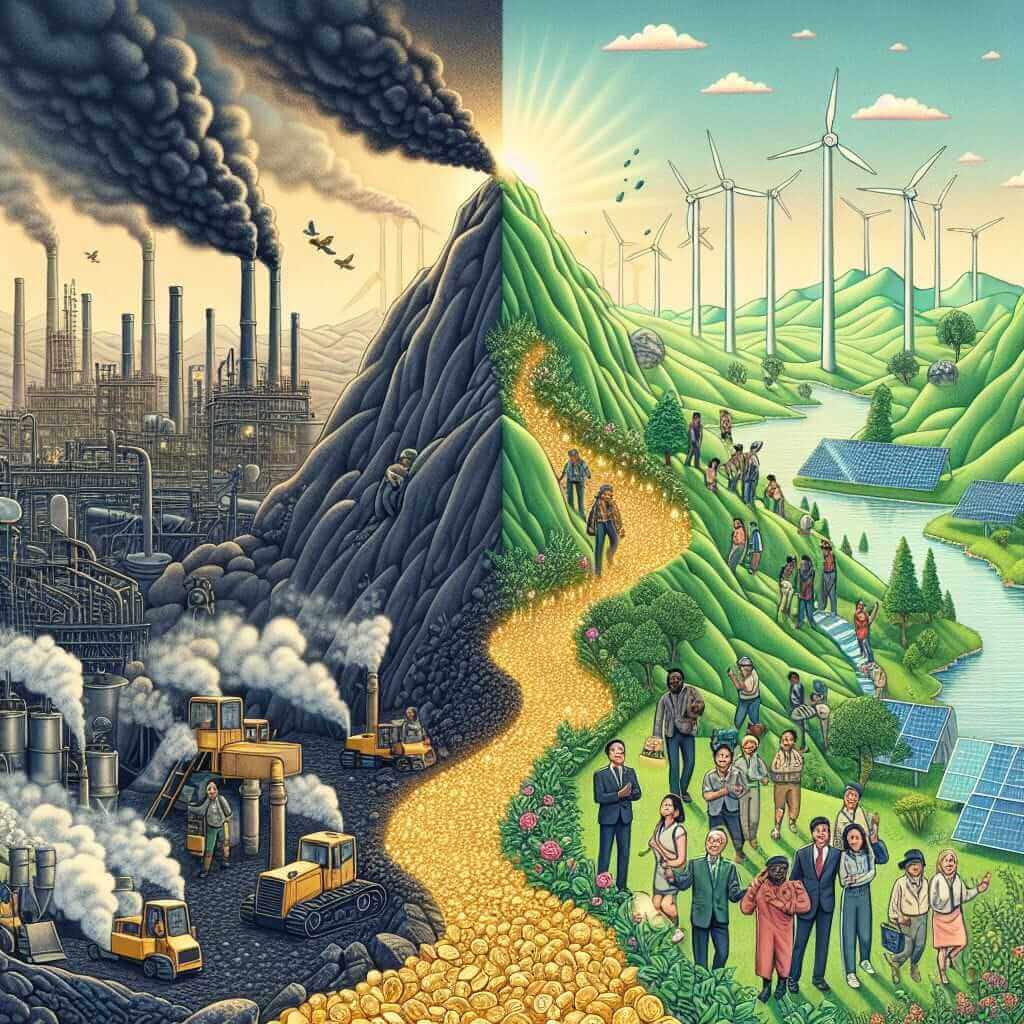The IELTS Reading section tests your skills in understanding and interpreting texts on various topics. One such relevant topic in today’s world is the transition to a low-carbon economy. With the growing concern about climate change and the need for sustainable development, this subject has been increasingly popular in both academic and practical contexts. This suggests that similar themes could appear in future IELTS exams.
IELTS Reading Practice Test: Transitioning to a Low-Carbon Economy
Passage
Transitioning to a Low-Carbon Economy: Challenges and Opportunities
Climate change poses one of the greatest threats to humanity, leading to an urgent need for a shift towards a low-carbon economy. However, the transition comes with significant challenges.
Firstly, the reliance on fossil fuels is deeply ingrained in global infrastructure. Countries have built their economies around these energy sources, and transitioning to renewable energy requires substantial investment in new technologies and infrastructure. For instance, developing countries often lack the financial resources to invest in renewable energy, creating a significant barrier to change.
Secondly, political and economic interests often hinder progress. Fossil fuel industries have a powerful influence on government policies due to their substantial economic contributions. Policymakers may be reluctant to impose regulations that could harm these industries, even if it means delaying the transition to cleaner energy.
Thirdly, there is the issue of technological innovation. While renewable energy technologies have advanced significantly, they still face limitations. Solar and wind energy, for example, are intermittent and depend on weather conditions. Energy storage solutions, such as batteries, need further development to ensure a consistent energy supply.
Lastly, the social impact of this transition cannot be ignored. The shift to a low-carbon economy will potentially displace workers in fossil fuel industries, leading to unemployment and social unrest. Therefore, there is a critical need for policies that support retraining and job placement in renewable energy sectors.
Despite these challenges, the transition to a low-carbon economy also presents opportunities. Investing in renewable energy can stimulate economic growth and create jobs in new industries. Moreover, reducing carbon emissions can lead to healthier communities by improving air quality and reducing pollution-related health issues.
In conclusion, while transitioning to a low-carbon economy is fraught with challenges, it remains a necessary step for achieving sustainable development and combating climate change. Comprehensive strategies including technological, economic, and social policies will be essential to overcoming these obstacles.
Questions
-
Multiple Choice:
- What is one of the primary challenges in transitioning to a low-carbon economy?
a) Lack of interest from the public.
b) High investment costs in new technologies.
c) Insufficient global awareness.
d) Excessive reliance on wind energy.
- What is one of the primary challenges in transitioning to a low-carbon economy?
-
True/False/Not Given:
- The passage states that all countries have the financial resources to invest in renewable energy.
- Renewable energy technologies currently provide a consistent energy supply regardless of weather conditions.
-
Matching Information:
- Match the following statements with the paragraphs in the passage:
a) Influence of fossil fuel industries on government policies.
b) The social impact of transitioning to a low-carbon economy.
c) Opportunities presented by investing in renewable energy.
- Match the following statements with the paragraphs in the passage:
-
Summary Completion:
-
Complete the summary using the list of words below:
The transition to a low-carbon economy involves (i) challenges, including the need for substantial (ii) in new technologies and infrastructure. Political and economic interests also play a role in (iii) progress, and technological innovation is necessary to address the (iv) nature of renewable energy sources. Moreover, the shift may lead to social impacts such as (v) in fossil fuel industries.
Words: significant, investment, hindering, intermittent, displacement
-
Answer Key
-
Multiple Choice:
- b) High investment costs in new technologies.
-
True/False/Not Given:
- False: The passage mentions that developing countries often lack financial resources.
- False: Solar and wind energy are mentioned as intermittent and dependent on weather conditions.
-
Matching Information:
- a) Paragraph 2
- b) Paragraph 4
- c) Paragraph 5
-
Summary Completion:
- (i) significant
- (ii) investment
- (iii) hindering
- (iv) intermittent
- (v) displacement
Learning Points
- Common Mistakes:
- Misinterpreting the relationship between technological advancements and limitations.
- Overlooking the socio-economic impacts of the transition.
Vocabulary
- Infrastructure (noun): /ˈɪn.frəˌstrʌk.tʃər/ The basic physical systems and structures needed for the operation of a society or enterprise.
- Substantial (adjective): /səbˈstan(t)SHəl/ Of considerable importance, size, or worth.
- Intermittent (adjective): /ˌin(t)ərˈmitnt/ Occurring at irregular intervals; not continuous or steady.
- Retraining (noun): /riːˈtreɪnɪŋ/ The process of learning new skills or training for a new occupation.
Grammar Point
- Relative Clauses: Relative clauses are important for adding essential information within a sentence.
- Example: “Renewable energy technologies, which have advanced significantly, still face limitations.”
- Structure: [Relative pronoun] + [Subject] + [Verb]
Conclusion
Achieving a high score in the IELTS Reading section requires regular practice and exposure to varied topics. Understanding the challenges of transitioning to a low-carbon economy not only prepares you for potential exam texts but also broadens your knowledge on a crucial global issue. Keep practicing and stay informed to excel in your IELTS exam.

Tips for High IELTS Reading Scores
- Regularly practice reading passages on diverse topics.
- Focus on improving your vocabulary and grammar.
- Take timed practice tests to build speed and accuracy.
- Review answer explanations to understand your mistakes and learn from them.